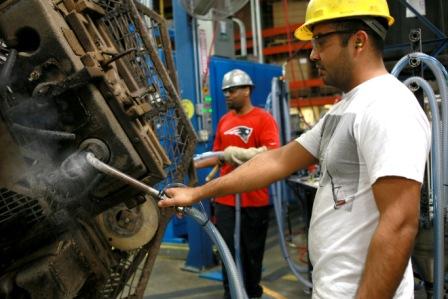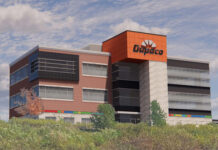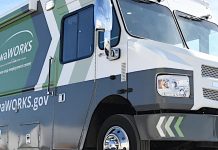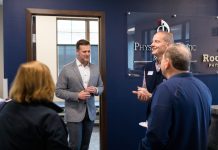
By Gigi Wood
NORTH LIBERTY – It will be a big year for Centro.
The North Liberty-based custom rotational molding company announced in November it plans to open a 90,000-square-foot manufacturing facility in Beaver Dam, Wis., adding 70 new jobs. Centro also is planning its largest product launch in company history, as well as an expansion into Brazil, its first overseas manufacturing facility.
These new endeavors will bring the number of Centro manufacturing locations to eight, with an engineering center in Northern Ireland and the number of employees to 1,000 by the end of 2014.
Centro defined
Centro was created in 1970 in Oxford by Dick Rozek, after he considered the possibility of replacing metal tanks on agricultural machinery with rotationally-molded plastic ones. He convinced John Deere Des Moines to switch to plastic for their sprayer tanks, and Centro was born.
Mr. Rozek’s son, Gary, took over and helped the business grow through the 1980s and 1990s, expanding from tanks to cab roofs, ducts and parts for the front end of combines. None of the Rozeks are part of Centro’s senior leadership, but Gary Rozek is chairman of the board. Brian Olesen was named president and CEO in 2005 after serving as sales engineer, general manager and vice president of operations for the company.
Mr. Olesen said agriculture remains its largest industry customer.
“Ag has been very good to us,” he said. “Since the crisis of 2008, 2009 that has been the industry that has held up the strongest. That’s our core industry, so that has really provided the foundation of our business. And we’ve been able to supplement that.”
In recent years, Centro has found new markets in construction, lawn and garden and consumer products. For example, last week, North Liberty workers were producing and assembling beverage coolers that would be sold at Scheels.
Simply put, Centro creates molded plastic products for specific clients from design to finished product.
“There’s a molding machine where we take, we have a pellet that we bring in on rail car and bring it in-house, we pulverize it into a powder and it gets distributed to the machines,” Mr. Olesen said. “The machine workers will put it in one of the molds, close it up, it goes in the oven for about 20 minutes, it goes to the cooling chamber for about 20 minutes and then it will come out and we’ll have our product.”
Workers will assemble the products, box and ship them.
“None of our products say Centro or have our name on it,” he said. “We’re a custom molder so everything we do goes to an industry leading company like Yeti or agriculture, construction, lawn and garden.”
Company growth
In 1990, Centro had $11 million in sales.
“To put it in perspective, during the crisis years of 2009, we were about $75 million in sales and next year we’ll probably be more than $150 million in nine locations,” Mr. Olesen said. “So we really doubled business in a pretty short period of time, through organic growth.”
Centro has relied on its management team to lead the company through the growth, with little to no outside help.
“We really try to be true to our roots and from the foundation when Dick Rozek founded the company and Gary Rozek, his son, took over and really had a philosophy of when you do something, you really want to make sure you do it right,” Mr. Olesen said. “We’ve had growth opportunities that we’ve passed on because we haven’t felt we’d be able to execute it to the level of that high standard. We’re blessed with a really strong management team, so we’re able to focus on a number of different initiatives and deliver and grow the business successfully. But it is a very busy time. People are definitely stretched as we expand at this rate and with actual facilities that have to be designed, built and staffed.”
In addition to its new facilities in Brazil and Wisconsin, Centro recently opened an engineering center in Northern Ireland.
“Our vice president of engineering is from Northern Ireland,” Mr. Olesen said. “There is a research university there that offers a PhD in roto molding and is the only one in the world that does. And that’s where he graduated from. Then we had some very strong incentives from the government to open an office there.”
The company has increased its emphasis on its engineering services in recent years. Centro employs 36 engineers at its various locations.
“We made the shift a couple of years ago from a manufacturing company that does some engineering to an engineering firm that’s doing rotational molding,” he said. “It’s opened a lot of doors for us and it’s a niche there was a need for. We just completed a major engineering project for a company in South Korea.”
New products
Those engineers are creating new products for Centro that are helping the company enter new markets. A few weeks ago, Centro received its patent for its RotoLoPerm technology, which it licenses out to its competitors. RotoLoPerm is multi-layer tank technology developed by Centro in 2004. This technology is approved for low evaporative emissions regulations by the California Air Resources Board (CARB) and the Environmental Protection Agency (EPA).
“It’s been a multi-year endeavor. It’s taken us longer to get the patent than it did to develop the technology,” Mr. Olesen said. “But basically we have an in-house technology that meets carbon EPA regulations for small horsepower gasoline tanks. It’s been the solution of choice for the industry. We license the technology to three other roto-molders and we’re roto-molders, so three of our, what we would normally consider to be our competitors, license the technology from us. We also have a number of our existing customers who take advantage of it.”
EPA regulations have also sparked the innovation that will be Centro’s largest product launch. Centro in 2014 will begin producing diesel exhaust fluid (DEF) tanks for off-road vehicles.
“(The new tanks) basically cleanse the exhaust before it goes into the atmosphere,” he said. “These vehicles we already have fuel tanks and hydraulic tanks and now they have to have a DEF tank and so all of our existing customers, plus some new customers have come to us for this DEF tank and that will be launching (in 2014) and is one of the reasons that has required our expansion and fueled our growth.”
New locations
Centro opens new facilities near or on-site of customer factories.
“One of the reasons we have the footprint and the number of locations we have is because of the product we build is typically quite large and takes up a lot of space to ship so one of the advantages we bring to our customer base is to have a proximity relationship, where we manufacture in some cases in their facilities and we mold a large part and we push it down the line and they assemble it on their end,” Mr. Olesen said. “What’s really exciting for me is, we’ll have eight manufacturing facilities and every one of them is being run by someone who started as a machine operator or a finisher on our lines and have risen through our business to be operations leaders at our facilities.”
The North Liberty headquarters will provide the support structure for the new endeavors and new jobs and opportunities will spring from those. But for now, Centro has no plans to expand at its 33-acre site in North Liberty.
“Today, the labor pool in the Corridor doesn’t support getting much bigger than we are,” Mr. Olesen said.
From 2010-2012, Centro experienced 64 percent revenue growth and was named one of the Corridor’s Fastest Growing Companies in May.




